Our feline friends are loving, intelligent – and often misunderstood. But cat lovers have always known that cats don’t fit society’s stereotypes. In my book, Purr: The Science of Making Your Cat Happy, I look at what feline science tells us about pet cats and how we can use it to make their lives better. From setting your house up right to training your cat, these days there’s a surprising amount of new information to draw on.
The seven books that follow will help you understand your cat better and develop an even better relationship with them than you already have. And if your cat has behaviour issues, you’ll find plenty of sage and scientifically-sound advice too.
Read more about animal books:
- 7 of the best dog books to help you understand your furry friend
- 5 of the best dinosaur books for adults and kids
- Natural Selection: 5 of the best books on evolution
7 of the best cat books
Cat Sense: The Feline Enigma Revealed

John Bradshaw
Feline science can help us to see cats as they really are, and in this thoughtful and authoritative book, Dr John Bradshaw takes us on a tour of the biology and behaviour of the cat.
We learn about the geographic and historical origins of the domestic cat and how it shapes the behaviour of our pet cats today. Chapters cover how kittens learn to be domestic cats, the social lives of cats (with other cats and with their people), cats’ thoughts and feelings, and the challenges facing the species today.
Delightful drawings accompany the text, and text boxes provide tips and additional information to help you with your cat. Cat Sense is a must-read that will help you see your cat in a new light.
The Inner Life of Cats: The Science and Secrets of Our Mysterious Feline Companions
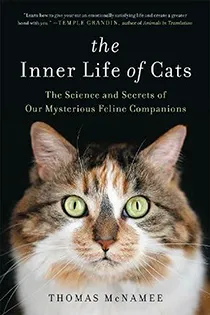
Thomas McNamee
For a well-researched summary of feline science with a particular focus on kittens and cat development, look no further than Thomas McNamee’s book, The Inner Life of Cats. In amongst the science, McNamee shares stories of his own cat, Augusta, who was abandoned in the snow near his property as a kitten.
McNamee went to great lengths to track down a psychologist, Dr Eileen Karsh, whose important work on kitten development is now out of print. This interview, and his visit to a colony of feral cats in Rome, are amongst the highlights of this fascinating book.
The reader is left with a deeper understanding of how cats evolved, and how kittens mature into adult cats.
SQUIRREL_TEXT_13075463
The Trainable Cat: How to Make Life Happier for You and Your Cat
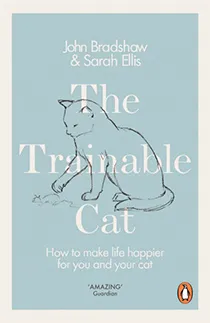
John Bradshaw and Sarah Ellis
This book by Dr John Bradshaw and Dr Sarah Ellis starts from the premise that we can make life better for our cats by training them to cope with the kinds of things that are essential, but often disliked by the cat.
The beginning chapters explain how cats learn, help you assess the kind of training that would benefit your cat, and teach you the skills you need to do it. Further chapters take you through the training that will help your cat in different aspects of their life, from getting on with children, other cats and other pets, to helping them learn to be handled and of course going to the vet.
The Trainable Cat is a delightful, insightful, and practical book.
The Cat: A Natural History
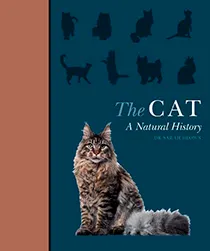
Sarah Brown
A coffee table book that is also based on science, The Cat: A Natural History by Dr Sarah Brown is informative and entertaining.
Starting from the origins of the domestic cat, we go on a tour of the cat’s anatomy and senses, feline communication and behaviour, their relationship with us, and some of the issues that face pet cats.
Later, a directory describes the looks and personalities of different breeds of cat. If you want to choose a pedigree, all the information you need is here.
Beautifully illustrated with photos and drawings of cats on every page, this is a gorgeous book.
SQUIRREL_TEXT_13073112
The Cat Personality Test: How Well Do You Really Know Your Cat?
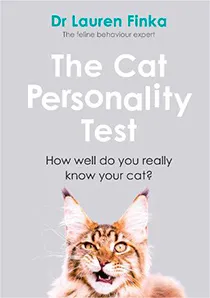
Lauren Finka
There’s a lot packed into this fun little book. Dr Lauren Finka has taken what we know from feline science and turned it into a set of quizzes that you can answer with your own cat in mind. The results will give you tips tailored to your particular cat’s personality. So whether your cat is shy or bold, there are suggestions for you here.
The quizzes look at a range of topics from your relationship with your cat and how well cats in a multi-cat home get along with each other, to finding out what kind of cat is best for you. In between the quizzes, Science Corner sections discuss recent research.
The Cat Personality Test is a cute, engaging book that makes a great gift.
SQUIRREL_TEXT_13075442
Decoding Your Cat: The Ultimate Experts Explain Common Cat Behaviors and Reveal How to Prevent or Change Unwanted Ones
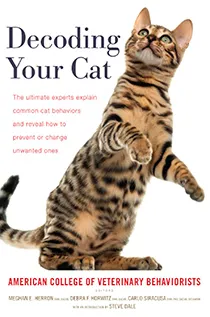
American College of Veterinary Behaviorists
If you want to know how to prevent or resolve behaviour issues in cats, this book, edited by Dr Meghan E Herron, Dr Debra F Horwitz and Dr Carlo Siracusa with an introduction by Steve Dale, is for you.
The book starts with how to set up your home for your cat and some tips on cat behaviour, before moving on to behaviour issues such as house soiling, compulsive grooming, and aggression. Some things that people think are behaviour issues – like scratching – are actually normal feline behaviours and it’s our job to learn how to accommodate them.
This book tells you when to seek help and how to get your cat to the vet. With real-life examples and actionable advice, your vet will approve of Decoding Your Cat.
CatWise: America’s Favorite Cat Expert Answers Your Cat Behavior Questions
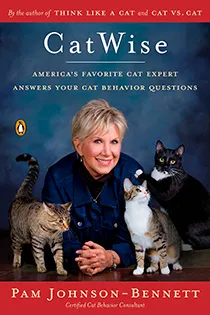
Pam Johnson-Bennett
Every cat guardian’s bookshelf surely includes something by Pam Johnson-Bennett, whose Think Like a Cat first encouraged us to see things from our cat’s perspective. Now in CatWise, Johnson-Bennett answers common questions about cats.
This is an authoritative guide that covers all aspects of cat care. Each chapter has a question-and-answer format, making this a perfect book to dip into whenever you have questions about why your cat does certain things. Whether you want to know what kind of litter tray your cat will like best, or how to spot signs of distress or illness in your cat, you’ll find it in here.
The book is clear, easy to understand, and written with a nice sense of humour.
